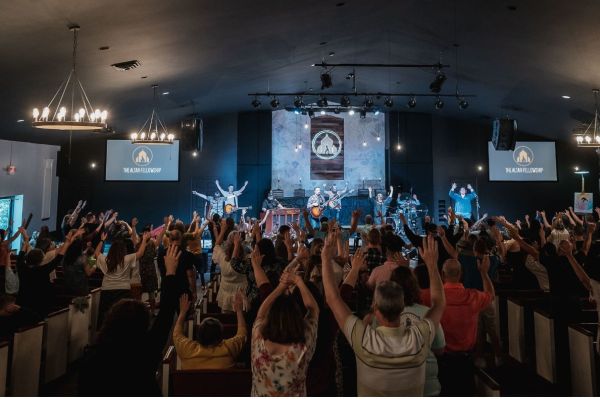U.S. Episcopal Head Opens Triennial Convention with 'Crisis' Talk
In her first opening address to the General Convention of The Episcopal Church, the Most Rev. Katharine Jefferts Schori made it very clear that the denomination she presides over is in the middle of a crisis - one that has several parts.
"The overarching connection in all of these crises has to do with the great Western heresy – that we can be saved as individuals, that any of us alone can be in right relationship with God," the U.S. Episcopal leader remarked Tuesday, in opening the July 8-17 gathering of her denomination's primary governing and legislative body.
"That individualist focus is a form of idolatry, for it puts me and my words in the place that only God can occupy, at the center of existence, as the ground of all being. That heresy is one reason for the theme of this Convention," she added.
According to Jefferts Schori, the theme of the convention, an African concept known as "Ubuntu," implies, "selfishness and self-centeredness cannot long survive."
"We are our siblings' keepers and their knowers, and we cannot be known without them – we have no meaning, no true existence in isolation," she stated.
Jefferts Schori's address was delivered as The Episcopal Church continues its struggle to keep its members united following the divisive election of the denomination's first openly gay bishop, V. Gene Robinson of New Hampshire.
Since the 2003 election, a number of churches have withdrawn completely from both the Episcopal Church and the wider Anglican Communion to form their own Anglican jurisdictions. Others have withdrawn from the Episcopal Church but aligned with other bodies within the Anglican Communion.
Last month, around 700 breakaway parishes in North America officially united into a single church body – the Anglican Church in North America – that is meant to serve as an orthodox, Anglican, mission-minded, and biblically-centered province. Together, the parishes represent some 100,000 conservative Anglicans.
Though never directly mentioning critics of The Episcopal Church, Jefferts Schori noted that "some quarters" insist that "salvation depends on reciting a specific verbal formula about Jesus."
"The temptation for us here will be to see one small part of God's mission, the part each one of use holds most dear, as the overarching reason for this church's existence. The reality is that God's mission will continue, whatever we do here, but it may not advance as effectively or penetrate as widely in the next few years if we get selfish or miss the mark," she said.
Furthermore, she added, there are aspects of mission that are more appropriate and effective at the congregational and diocesan level.
"We might also consider putting in that category the big picture issues we can't yet agree on – the ones for which we have many, more local, and varied understandings, recognizing the different contexts may require different responses," she added, possibly suggesting that congregations should be given leeway to decide individually on the issue of homosexual clergy and same-sex unions as the Presbyterian Church (PCUSA)'s governing body voted to do in 2006.
Episcopal leaders at this year's convention, which takes place in Anaheim, Calif., will be considering a number of resolutions that center around the issue of homosexuality.
One new resolution that will be introduced and debated at this week's General Convention will seek to extend a key marriage ritual to gay and lesbian couples, particularly in the six states that recognize same-sex marriages – Massachusetts, Maine, Vermont, New Hampshire, Iowa and Connecticut.
"In all six states, faithful Episcopalians are asking that their church provide the pastoral support and blessing of the church for their marriages," reads an explanation attached to the resolution. "Clergy in those same states are caught between the authority given them by the state and the discipline of The Episcopal Church as it's currently described."
The Diocese of Massachusetts is further calling on the General Convention to amend references in The Episcopal Church's canon laws on marriage from "a man and a woman" to "two adults."
The loudest of the calls, arguably, is that of some dioceses to repeal or retract B033, a resolution passed in 2006 that calls for restraint in ordaining bishops "whose manner of life presents a challenge to the wider church" – mainly noncelibate homosexuals.
The Diocese of Newark argues that B033 was never intended to be permanent and that it was only passed to prevent further fractioning of the worldwide Anglican Communion.
Anglican leaders overseas, however, have warned The Episcopal Church against rescinding resolution B033 or passing any resolution that would further put the American church body at odds with the larger Anglican Church.
The Most Rev. Drexel Gomez, the Archbishop of the West Indies and chairman of the Covenant Working Group, said in May that if the General Convention rescinds resolution B033 and removes any barriers to persons involved in same-sex relationships, it will "imperil" the work of the Covenant and will have an impact on the rest of the communion because of the responses others will need to make.
In her opening address Tuesday, Jefferts Schori reminded the General Convention that its triennial gathering is always a time of critical decision-making.
"The decision-making we face here is an opportunity to choose the direction of our journey into God's mission," she said.
"We will fail if we choose business as usual," the presiding bishop added.
This week's General Convention, the 76th, comes two months after the Anglican Consultative Council, a decision-making body of bishops, clergy and laity, reaffirmed the moratoria on the consecration of partnered gay bishops and the authorization of public rites blessing same-sex unions.
The council also voted to delay the release of the Anglican covenant – a document seeking to uphold the autonomy of the Communion's 38 provinces while asking for their voluntary commitment to a process of joined-up deliberation to solve disputes over contentious issues – in order to make more revisions.






















